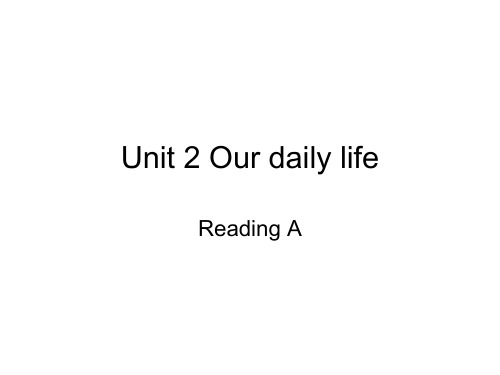our daily life教案
- 格式:doc
- 大小:62.00 KB
- 文档页数:8






Unit 2 Our daily life Period One Teaching target 1 Talking about cartoons. 2 Talking about daily lives. 3 Skimming the passage. 4 Learning the new words.
1. Ask students the following question: What sentence do students say most often in school? 2. Give students some time to look at the cartoon . Ask them toread the three sentences in this cartoon carefully. 3. Question What can we learn from this cartoon? 4. Meaning of this cartoon This cartoon is shown to tell us that something may happen bychance. The question Hi asked is an IQ one. But Lo's answer was 'Idon't know.' But it is the right answer to the question that Hiasked. So we can conclude that something may happen by chance thatwe haven't expected. And also, this cartoon is about school life. And the main passagein this Unit is also about the school life.
Daily life talk 1.Write 'daily life' on the board. Write 'day ' daily' as well. Ask students to guess the meaning of'daily'. Then have them work out the meaning of 'daily life'. Introduce daily / a. that happens or comes every day or once aday每日的;每天一次的 Introduce: daily English, daily talk 2. Question What do you usually do in your daily life? 3. Have students look at the pictures in A andask What do you know about…? Ask them to talkabout themselves with these activities by using the followingsentence patterns. I … every day. I … once/twice a week. I never … 4 Invite some more able students to talk more about their dailylives.
Skimming 1. Review the meaning of 'skim' with students. Invite one or twostudents to tell the meaning of 'skim'. 2. Ask students to look at the title, the subtitle and the pictureson page 19 in the passage. subtitle / n. subheading副标题;小标题 3. Have students finish the exercise in B Look and think. similar / a. the same in some ways but not completely thesame类似的;相似的 be similar to 与…相似 be different from 与…不同 expect / v. think that somebody or something will come or thatsomething will happen预料;预计 4. Check the answers orally.
New vocabulary items 1 life / n. [Title] the way that you live生活方式 e.g.an unhappy life 2. whiz / n. [Subtitle] one who has remarkableskill专家;奇才;技术出众的人 3. kid / n. [Subtitle] a child 小孩;孩子 4 whizz-kid / n. 5. [Subtitle] 1. a quite cleverchild/student神童;优等生 2. a clever person who moves ahead inlife very quickly领先者;弄潮儿 6. top / a. highest最高的 e.g.Put the book on the top shelf. Mary is the top student in our class. 7. business / n. buying and selling things买卖;生意;商业 Note that if we are talking about specific companies, business is acountable noun. But if we are talking about trading and makingmoney in general, business is an uncountable noun. businessman - businessmen businesswoman - businesswomen e.g.Sony, Ford and Coca-Cola are three big businesses. Business is very important to Hong Kong. e.g.school uniform 8. manager / n. [L16] a person who controls a business, bank orhotel, etc.经理,管理人 9. discuss / v. talk about something谈论;讨论;议论 e.g.We must discuss the problem of old people. 10. client / n. a person who pays another person,for example a lawyer or an accountant, for help oradvice客户;委托人 11. simple / a. easy to do orunderstand简单的;简明的 e.g.This dictionary is written in simple English. 12.achieve / v. do or finish something well aftertrying hard通过努力实现;获得;实现 e.g.I achieved my aim: to run one mile in under five minutes. 13.grade / n. how good something is; the level ofquality of something等级;级别 e.g.achieve A grade Which grade of petrol does your car use? 14. fail /feIl/ v. not pass an exam ortest不及格;不合格 fail =! pass 15. exam / n. a test of what you know or cando考试 e.g.fail the exam pass the exam 16.collect / v. go and bring somebody or something from aplace领走;接走 e.g.My father collected me from school in the past. 17. attend / v. go to or be at a place wheresomething is happening参加;出席 e.g.Will you attend that meeting? 18. continue /kEn5tInjU:/ v. [L60] 1. not stop happening or doingsomething继续做某事 2. start again afterstopping(停止后)再开始 e.g.We continued working until 5 o'clock. Let's have lunch and continue the meeting this afternoon.
Consolidation 1 Copy and recite the new vocabulary items in this period. 2 Scan the passage after class.
Period Two Teaching target 1 Reviewing the new vocabularies 2 Scanning the whole passage 3 Analyzing the whole passage
A small check-up 1 Write out the word according to the given meaning. a) talk about something d__________ b) not pass f__________ c) a quite clever child w__________ d) a kind of test e__________ e) highest t__________